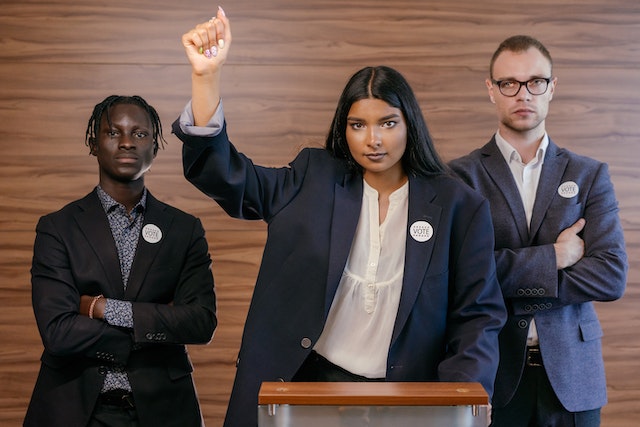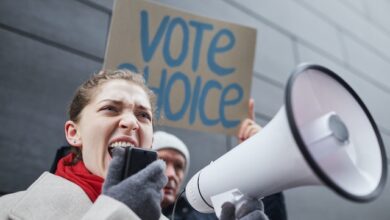How to Prepare for Election Debates in the US | Strategies for Effective Communication
Strategies for Effective Communication

The US election season is here, and the debates are key components in influencing voter decisions. In fact, many voters will base their choices on how they perceive a candidate’s performance during these events.
This makes it crucial for candidates to have a solid preparation strategy that ensures effective communication. I’ll be sharing some valuable insights on how to prepare for election debates in the US and strategies for effective communication that can help you win over your audience. So let’s get started!
Understand the Role of Debate
Debates are a crucial part of the election process, as they allow candidates to showcase their knowledge and skills while also presenting their platforms to potential voters.
The role of debate is not just limited to providing entertainment or attracting media attention; it serves a much more significant purpose in shaping public opinion.
Debates help voters understand where each candidate stands on important issues such as healthcare, immigration, and education. By listening to candidates’ responses to questions posed during the debates, voters can assess which candidate aligns with their own beliefs and values.
Another essential role of debate is holding politicians accountable for their actions and statements. During a live debate, candidates cannot hide behind prepared speeches or press releases – they must think quickly on their feet and provide clear answers that hold up under scrutiny. This level of transparency helps build trust between citizens and elected officials.
Debates also serve as an opportunity for candidates to demonstrate their communication skills. Effective communication is critical for any leader who wants to inspire confidence in those they represent.
Debating requires strong listening skills, quick thinking abilities, persuasive language use, eye contact- all traits that make effective communicators.
In conclusion understanding the importance of debates goes beyond entertaining viewers but allows you see how well political leaders perform under pressure by testing them with tough questions so you can make informed decisions come voting day!

The Different Types of Debates
Debating is a highly structured form of communication that involves two or more individuals presenting and defending their viewpoints. There are several types of debates, each with its own unique style and approach.
One type of debate is the Lincoln-Douglas Debate, which focuses on values and philosophical principles. It usually features a single speaker per side who presents their arguments in a logical and persuasive manner.
Another type of debate is the Oxford-style Debate, also known as British Parliamentary-style Debate. This format involves four teams consisting of two speakers each, representing both sides of an issue. The goal is to present compelling arguments while rebutting those made by the opposing team.
A third type of debate is the Town Hall Debate, which encourages interaction between candidates and audience members. This format allows for questions from the audience that can be answered by the debaters directly.
No matter what type of debate you are participating in, it’s important to understand your role as well as your opponent’s position. By doing so, you can tailor your arguments for maximum effectiveness while anticipating counterarguments against them.

The Purpose of a Debate
The purpose of a debate is not to simply argue your own position, but rather to persuade others to see your point of view. It’s an opportunity for candidates to showcase their knowledge and expertise on specific issues and demonstrate their ability to think critically, communicate effectively, and engage with the audience.
Through debates, voters are able to evaluate each candidate’s ideas, policies, and leadership qualities. They can analyze how well each candidate understands complex issues and how they plan on addressing them if elected into office. Debates also allow voters the chance to see how candidates perform under pressure and respond in real-time situations.
Moreover, debates provide an arena where candidates can challenge one another’s arguments while defending their own viewpoints. By doing so, it helps viewers compare different solutions or approaches related to political issues that impact people’s lives.
In summary, debates serve as a platform for providing information about political ideologies while encouraging civil discourse among contenders vying for public offices. With this in mind, it is important for politicians participating in such events should be respectful towards one another’s opinions rather than resorting solely upon criticizing each other personally.

How to Prepare for an Election Debate
Preparing for an election debate can be daunting, especially if it is your first time. However, with the right strategies and preparation, you can feel confident and ready to tackle any question that comes your way.
Firstly, research the issues that are important to voters. This will help you stay informed about current events and enable you to articulate your stance on various topics clearly. It’s also essential to know your opponent’s position on these issues so that you can anticipate their arguments.
Next, practice speaking concisely and with clarity. Debates require quick thinking and communication skills; hence it is crucial not only to have relevant information but also deliver it effectively.
It would be best if you also spent time developing a platform for yourself – what do you stand for? What sets you apart from other candidates? Developing a unique perspective on policies or solutions will help viewers remember who they want representing them.
Prepare mentally by visualizing yourself calmly answering challenging questions confidently. Take deep breaths before stepping onto the stage as this helps calm nerves while promoting clear thinking during the event itself.
By preparing thoroughly beforehand in terms of research, delivery style, unique perspectives and mental preparedness – debaters give themselves their best chance at succeeding in an election debate setting!

Tips on How to Win an Election Debate
Preparing for an election debate is one thing, but winning it is another. Here are some tips that can help you impress the audience and come out on top:
Firstly, do your research. Familiarize yourself with the issues that matter to your constituents and know where you stand on them. This will give you a solid foundation to build upon during the debate.
Secondly, practice makes perfect. Practice debating in front of a mirror or with friends and family members who can offer constructive feedback. Take note of your body language, tone of voice, and pacing to improve your overall delivery.
Thirdly, stay calm under pressure. It’s natural to feel nervous before a debate, but try not to let those nerves get the best of you. Take deep breaths and focus on staying composed throughout the entire discussion.
Fourthly, engage directly with your opponent’s arguments instead of just attacking their character or party affiliation. You want to show voters that you have thoughtfully considered different viewpoints and can articulate your own ideas clearly.
Be authentic and genuine in all aspects of communication during the debate – from facial expressions to word choice – so viewers can relate better with what they see as real rather than staged responses.

FAQs
FAQs or frequently asked questions are a common feature of any topic, and election debates are no exception. Here are some of the most frequently asked questions about election debates:
What is an election debate?
An election debate is a public forum where candidates seeking political office engage in discussion on key issues.
Who participates in an election debate?
Typically, only major party candidates who have met certain criteria set by the organizers participate in an election debate.
What is the purpose of an election debate?
The primary purpose of an election debate is to provide voters with information about each candidate’s positions on important issues facing their community or country.
How long do electoral debates last?
The length of electoral debates varies depending on the format and number of participants. Most televised presidential debates last between 90 minutes to two hours.
Do moderators have complete control over each candidate’s speaking time during a telecasted debate?
Yes, moderators usually have strict rules for allocating time and ensuring fairness among all participants.
Conclusion
To sum it up, election debates play a crucial role in shaping the political landscape of the United States. They not only provide voters with an insight into candidates’ personalities and policies but also offer them an opportunity to compare and contrast different points of view.
Therefore, if you’re planning to participate in or watch an election debate, make sure that you prepare well by researching the issues at hand and practicing your communication skills beforehand.
Remember, effective communication is key when it comes to winning over voters during an election campaign. By following some simple tips such as staying calm under pressure, being confident yet respectful towards opponents, using persuasive language and facts instead of personal attacks; you can improve your chances of making a lasting impression on audiences.
So go ahead and put these strategies into practice so that you can make the most out of any upcoming election debates. Good luck!


